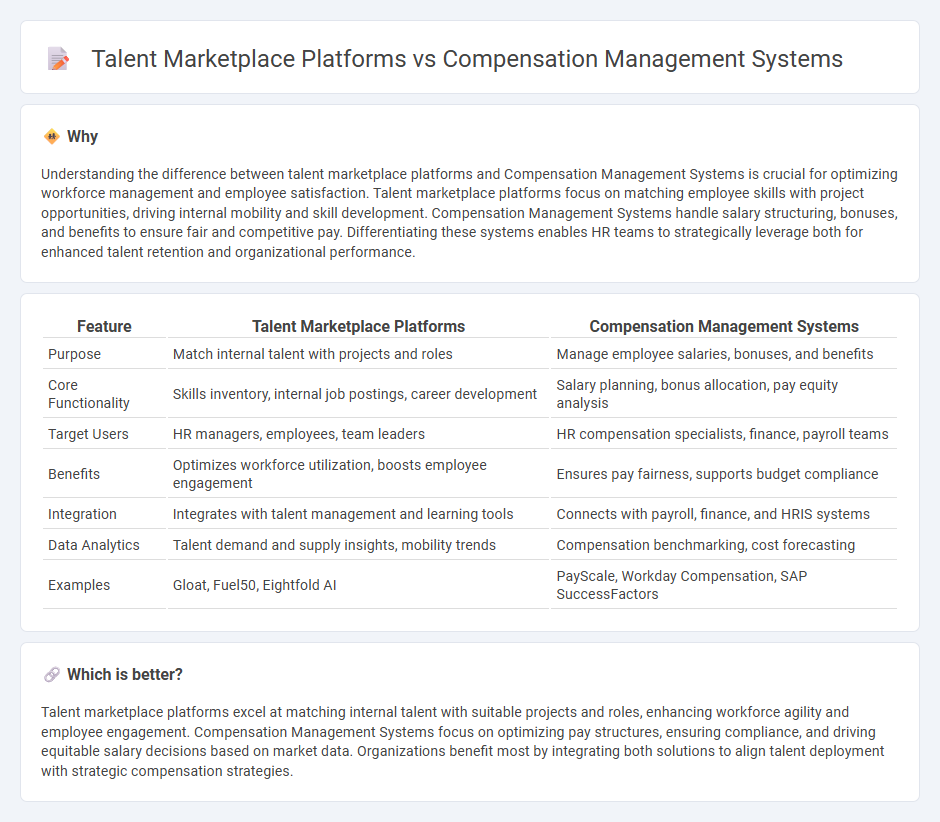
Talent marketplace platforms streamline internal mobility by matching employee skills with open roles to maximize workforce agility and retention. Compensation management systems focus on structuring pay, bonuses, and benefits to ensure fair and competitive employee remuneration aligned with company budgets. Explore how integrating these solutions can optimize HR strategies and enhance organizational performance.
Why it is important
Understanding the difference between talent marketplace platforms and Compensation Management Systems is crucial for optimizing workforce management and employee satisfaction. Talent marketplace platforms focus on matching employee skills with project opportunities, driving internal mobility and skill development. Compensation Management Systems handle salary structuring, bonuses, and benefits to ensure fair and competitive pay. Differentiating these systems enables HR teams to strategically leverage both for enhanced talent retention and organizational performance.
Comparison Table
| Feature | Talent Marketplace Platforms | Compensation Management Systems |
|---|---|---|
| Purpose | Match internal talent with projects and roles | Manage employee salaries, bonuses, and benefits |
| Core Functionality | Skills inventory, internal job postings, career development | Salary planning, bonus allocation, pay equity analysis |
| Target Users | HR managers, employees, team leaders | HR compensation specialists, finance, payroll teams |
| Benefits | Optimizes workforce utilization, boosts employee engagement | Ensures pay fairness, supports budget compliance |
| Integration | Integrates with talent management and learning tools | Connects with payroll, finance, and HRIS systems |
| Data Analytics | Talent demand and supply insights, mobility trends | Compensation benchmarking, cost forecasting |
| Examples | Gloat, Fuel50, Eightfold AI | PayScale, Workday Compensation, SAP SuccessFactors |
Which is better?
Talent marketplace platforms excel at matching internal talent with suitable projects and roles, enhancing workforce agility and employee engagement. Compensation Management Systems focus on optimizing pay structures, ensuring compliance, and driving equitable salary decisions based on market data. Organizations benefit most by integrating both solutions to align talent deployment with strategic compensation strategies.
Connection
Talent marketplace platforms streamline the identification and deployment of internal talent by integrating seamlessly with Compensation Management Systems, enabling data-driven salary adjustments based on skills, performance, and market trends. This connection ensures equitable compensation aligned with employee competencies and organizational needs while enhancing workforce agility and retention. Through real-time analytics and automated workflows, companies optimize both talent allocation and pay structures to drive strategic HR outcomes.
Key Terms
Salary Structure
Compensation management systems provide comprehensive tools for designing and maintaining salary structures based on roles, experience, and market benchmarks, ensuring internal equity and external competitiveness. Talent marketplace platforms, while primarily focused on matching skills with opportunities, offer dynamic salary insights reflecting real-time labor market demands and individual performance. Explore how integrating both solutions can optimize your organization's salary strategy and talent retention.
Pay Equity
Compensation Management Systems provide structured salary frameworks and ensure compliance with pay equity regulations by analyzing internal pay data and market benchmarks. Talent marketplace platforms facilitate dynamic talent matching and transparency but may lack robust tools for systematic pay equity auditing and adjustments. Explore how integrating both solutions can enhance your organization's commitment to fair and equitable compensation practices.
Internal Mobility
Compensation Management Systems streamline salary planning, ensuring equitable pay structures and compliance, while Talent Marketplace platforms enhance internal mobility by matching employees' skills with available opportunities, fostering career growth and retention. Integrating both systems can optimize workforce allocation and compensation alignment, driving organizational agility and employee satisfaction. Explore how combining these tools can transform your internal mobility strategy.
Source and External Links
20 Best Compensation Management Software of 2025 - This webpage lists and discusses the top compensation management software solutions available for salary planning, bonuses, and compliance.
The Most Scalable Compensation Management Software - beqom offers a comprehensive compensation management solution with features like continuous performance management, pay equity management, and workforce planning.
Best Compensation Management Software Reviews 2025 - This page provides reviews and ratings of compensation management software solutions, highlighting their capabilities in designing optimized compensation strategies.
 dowidth.com
dowidth.com